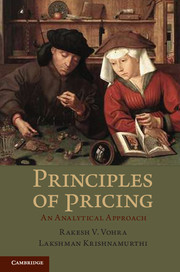9 - Appendix on Game Theory
Published online by Cambridge University Press: 05 June 2012
Summary
The word game in game theory is not limited to parlor games, such as bridge or Scrabble. It applies to all situations in which two or more agents are in competition with one another, such as a negotiation between labor and management or a price war between rival firms.
Let us begin with a simple situation to provide a flavor of what is to come.
John is currently the monopoly supplier of SOMA. Oskar is thinking of entering the SOMA business. What Oskar decides depends on how John will react to his entering the market. Will John lower prices to ruin Oskar, or will he maintain his current prices?
Oskar expects to be $50 million ahead if he enters the market and John accommodates his entry. If John decides to retaliate by lowering prices, Oskar will lose $100 million in total.
Oskar believes that John stands to make $500 million as a monopolist. This amount will be reduced to $400 million if John accommodates Oskar's entry. If John lowers prices in retaliation, he loses $200 million.
John has just announced that should Oskar enter the market, he will start a price war by lowering prices. Assuming that Oskar cannot afford to lose $100 million, should he enter the SOMA industry?
If Oskar believes John's threat, the answer is, of course, no. But why should Oskar believe this? Notice the following: if Oskar enters, which action gives John the higher profit? Accommodating Oskar's entry. He wins $400 million rather than lose $200 million.
- Type
- Chapter
- Information
- Principles of PricingAn Analytical Approach, pp. 230 - 244Publisher: Cambridge University PressPrint publication year: 2012



